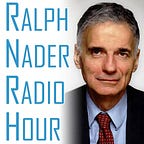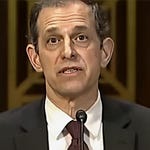Ralph welcomes New York Times reporter, Binyamin Applebaum, author of “The Economists' Hour: False Prophets, Free Markets, and the Fracture of Society” about how Chicago School economists of the late ‘70s and early ‘80s “who believed in the power and the glory of markets… transformed the business of government, the conduct of business, and, as a result, the patterns of everyday life.”
Binyamin Appelbaum is the lead business and economics writer on the Editorial Board of the New York Times. From 2010 to 2019, he was a Washington correspondent for the Times, covering economic policy in the aftermath of the 2008 crisis. He previously worked for the Charlotte Observer, where his reporting on subprime lending won a George Polk Award and was a finalist for the 2008 Pulitzer Prize. His latest book is The Economists' Hour: False Prophets, Free Markets, and the Fracture of Society.
The central attraction of neoliberalism—of market fundamentalism— is that it tells rich and powerful people that they are right and good. It underscores for them, it affirms them, it tells them that their priorities—their interests— are the right ones. And if society just does what it can to enrich them and empower them, then everyone will be better off. That’s an enormously attractive message.
Binyamin Applebaum
In area after area, we saw economists reaching broad conclusions about theories, about long-term truths, about how the world works on the basis of very limited data. Broad data. Data that aggregated everyone and treated them as if they were a single individual, rather than acknowledging the important differences among actors in the economy. Data that took very brief periods of history and extrapolated out to the unforeseeable future. And on that basis, economists reached conclusions that have proven to be empirically wrong as we’ve learned more about it.
Binyamin Applebaum
Economic analysis tends to exclude things that don’t fit neatly into its formulas— that can’t be easily counted or tabulated, that don’t count as data in the view of the economists… We can have very good real-world experience of the effects of drug regulation regimes or of corporate behavior and monopolistic contexts, and if it doesn’t tally on the data sheet it gets excluded from the analysis. It doesn’t become part of our policy-making conversation.
Binyamin Applebaum
We have a huge societal problem with our conception of spending on corporations as investment and spending on people as spending. When we talk about education, it’s an expense. When we talk about semiconductors, it’s an investment into the future. That’s insane. Spending on education is the most productive investment that we can make.
Binyamin Applebaum
What the market fundamentalist economists fail to take into account is greed and power, connected to one another, are infinite. There’s no discernible boundary. And that leads to a regulation by corporations of the competitive free market. So, monopolies distort markets. Subsidies and bailouts by the government distort market discipline. Political influence of big business over small business distorts market discipline. And consumer fraud, corporate consumer crimes, deceptive advertising distorts market discipline.
Ralph Nader













